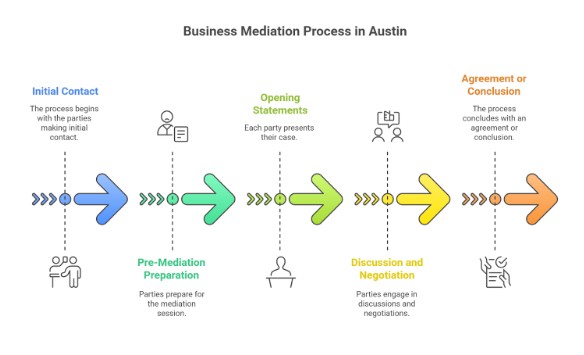Call Now For Service!
Originally published: October 2025 | Reviewed by Kim Torres

Small business disputes can quickly spiral out of control, damaging relationships and draining resources that could be invested in growth instead.
Austin’s entrepreneurial scene presents its own set of challenges, ranging from partnership disagreements to contract disputes, which require quick and effective solutions.
Business mediation provides Austin small businesses with a faster and less expensive alternative to litigation, helping to preserve the professional relationships that everyone relies on for long-term success.
Mediation doesn’t pick winners and losers like a court does. Instead, both parties work together to find solutions that actually benefit both sides.
Austin’s collaborative business culture makes mediation a natural fit. Mediation allows people to discuss issues in a safe, neutral space, which aligns with the city’s reputation for innovation and partnership-driven problem-solving.

Austin’s business scene moves at breakneck speed. The Austin Chamber of Commerce advocates for a stronger economy and increased collaboration, but rapid growth can also bring friction.
Startups run into unique headaches. Partners disagree on where to take the business. Investors and founders butt heads over control. Vendors and clients argue over contract terms.
Common Austin Business Disputes:
Lawsuits can wreck growing businesses. They suck up cash and hurt reputations. Court battles can drag on for years—sometimes, who has time for that?
Mediation offers a better way.
Benefits for Austin Entrepreneurs:
Austin’s creative types need flexible solutions. Local makers building businesses often encounter zoning and operational challenges. Even small disputes can undo years of work.
The city supports innovation through programs like the Circular Austin Showcase, connecting investors and entrepreneurs. Effective dispute resolution maintains these connections.
Resolve your Austin business disputes quickly and fairly with Torres Mediation’s business mediation services. Protect your company’s future and save valuable resources—contact us today to schedule your consultation.
If you’re ready to get started, call us now!

Austin businesses encounter three main types of disputes that can significantly disrupt operations.
Partnership disagreements over management decisions, contract issues with vendors or clients, and workplace conflicts are the primary sources of headaches for local companies.
Partnership disputes often arise when business owners disagree on the direction of the company. One partner wants to grow, the other wants to keep things small.
Money fights arise when partners disagree over profits or expenses. Sometimes, one partner feels like they’re doing all the work but getting the same cut.
Common partnership issues include:
Shareholder disputes in Texas often arise from disagreements over management and financial matters. These fights can tear apart businesses built over years.
Austin’s tech startups experience numerous founder disputes. One founder might feel they’re pulling more weight, but still have to split ownership evenly. That kind of resentment can quickly end partnerships.
Small businesses in Austin frequently encounter contract headaches. Vendors deliver late or send shoddy products. Clients sometimes refuse to pay or change the project halfway through.
Typical contract disputes involve:
Numerous contract disputes plague Austin’s construction industry. Contractors argue about extra costs, while property owners insist those were already included. These fights can stall projects for months.
Restaurant owners butt heads with suppliers over delivery times and quality. If suppliers drop the ball, restaurants lose money and customers in a hurry.
Workplace conflicts can significantly impact Austin businesses. Employees claim unfair treatment or discrimination. Managers struggle with staff who either fail to follow rules or simply don’t perform.
Common employment disputes include:
The Austin office handles employment disputes along with other business blowups. These cases eat up legal fees and productivity.
Austin’s service industry sees numerous wage disputes. Servers complain about missing tips. Kitchen workers fight over how overtime gets calculated.
Small tech companies often get entangled in non-compete battles when employees leave for rival companies.
Former staff members might use company secrets at their new jobs, which can trigger even more legal trouble.

The business mediation process in Austin is structured yet straightforward. A neutral mediator helps everyone discuss the dispute privately and confidentially.
One or both sides reach out to a mediation service. The mediator looks over the details and sets up a session.
Sometimes, parties submit mediation briefs explaining their positions. This gives the mediator a heads-up before everyone meets.
Each side tells its story. The mediator listens, with no judgment, just to get the lay of the land.
The mediator steers the conversation. Sometimes, they speak to each side separately to explore possible solutions.
Key Process Elements:
| Element | Description |
| Confidentiality | All discussions remain private |
| Voluntary | Parties choose to participate |
| Neutral Setting | Mediator stays impartial |
| Cost-Effective | Less expensive than the court |
If everyone agrees, they write it down. If not, they can still go to court or try something else later.
Austin mediators handle a wide range of business conflicts, including contract disputes and service disagreements.
Most mediations are completed within a day, but the duration depends on the complexity of the dispute.
Most business mediations settle before anyone steps foot in a courtroom. That saves time and keeps business relationships from falling apart.
Facing challenges with a business partner or contract? Torres Mediation helps Austin companies find workable solutions without the courtroom. Maintain your business relationships—schedule a confidential mediation session with Torres Mediation today.
If you’re ready to get started, call us now!
Austin’s business world is diverse, so different industries encounter their own unique types of disputes.
Tech startups argue over intellectual property, restaurants struggle with supplier issues, and retail shops dispute leases with landlords.
Austin’s tech community faces unique challenges that necessitate specialized mediation skills.
Disagreements over equity splits and who has the authority to make major decisions emerge as companies expand.
Common Tech Disputes:
Software projects often become messy due to missed deadlines or scope creep. Mediators help startups navigate these challenges without burning bridges for future projects.
In tech, employment disputes often center on stock options and vesting. Remote work brings its own headaches—everyone’s got different ideas about performance and communication.
Restaurants and hospitality businesses often encounter operational disputes that require prompt solutions. Supplier payment conflicts can disrupt daily business and compromise customer service.
Employee fights in restaurants often involve issues related to tips or scheduling. When the kitchen staff can’t get along, it affects food quality and slows down the process.
Typical Restaurant Disputes:
Franchise disputes require careful handling to maintain brand relationships. Territory fights between franchisees require solutions that allow everyone to continue doing business.
Seasonal businesses struggle with cash flow during slow months. Mediation helps keep vendor relationships alive when money’s tight.
Small retail shops experience landlord-tenant disputes more frequently than most—rent hikes and disputes over who pays for repairs often lead to arguments that require mediation.
Customer complaints can escalate into legal fights. Product liability claims and service disputes can threaten a business’s reputation, but they must still be resolved fairly.
Common Retail Conflicts:
Inventory and supplier disputes significantly impact daily operations. Late deliveries or poor quality force owners to find quick solutions so the business doesn’t grind to a halt.
Most small shop owners don’t have the budget or time for drawn-out legal battles. Mediation offers a cost-effective solution, allowing cash to flow for what truly matters—running the business.
Austin business owners typically face two main paths when disputes arise. They can opt for mediation or litigation to resolve their issues.
Mediation involves a neutral third party who facilitates discussions between parties. The mediator guides the conversation but doesn’t hand down any final decisions.
Litigation means heading to court. A judge or jury steps in and decides how things ultimately turn out.
| Factor | Mediation | Litigation |
| Time | Weeks to months | Months to years |
| Cost | Lower fees | Higher attorney and court costs |
| Privacy | Confidential process | Public court records |
| Control | Parties decide the outcome | The judge/jury decides |
| Relationships | Preserves business ties | Often damages relationships |
Business mediation is gaining popularity among companies in Austin. It lets them skip expensive and drawn-out court cases.
Mediation offers business partners the opportunity to maintain their working relationships. The process aims for solutions both sides can live with.
Litigation steps in when mediation falls apart. Courts back up these rulings, so they carry legal weight.
Austin businesses often try mediation first. If talks collapse, they still have the option to litigate.
The right choice depends on the nature of the dispute and the importance of the relationship. Mediation may be better suited for resolving simple contract disputes than for complex cases involving fraud.
Business disputes don’t always have to wreck relationships. Mediation preserves ongoing work relationships way better than court showdowns.
Court fights create winners and losers. This kind of process can wreck trust for good. Mediation, though, leads to mutual agreements where both sides feel heard.
Small business owners face conflicts with partners, employees, customers, and vendors. These relationships often need to continue after the dust settles.
Key Relationship Benefits:
| Court Litigation | Mediation |
| Adversarial process | Collaborative approach |
| Public records | Private discussions |
| Judge decides outcome | Parties control the result |
| Relationship damage | Relationship preservation |
The mediator helps both sides see each other’s concerns. That builds empathy—maybe even a little understanding—instead of just resentment.
Business partnerships benefit the most from mediation. Partners must work together every day after a dispute, and court battles make that nearly impossible.
Customer relationships tend to recover more effectively after mediation. Sometimes, a resolved complaint actually makes a customer more loyal than before.
Employee disputes handled through mediation can cool down workplace tension. Other staff notice when management treats people fairly.
Business mediation offers opportunities for open communication and fosters stronger relationships. Companies sometimes walk away with better policies and clearer expectations as well.
Austin’s business community offers numerous resources that complement mediation services.
The city’s chamber of commerce and business associations often advocate for mediation as a first step when conflicts arise.
Local business development centers step in to help companies determine if mediation is a suitable option.
They walk business owners through alternative dispute resolution options before the situation escalates.
Key Austin Business Resources:
These days, many Austin businesses include mediation clauses in their contracts. It saves everyone time and money when disputes show up later.
The city’s collaborative culture makes mediation an ideal solution for resolving disputes between business partners. Austin places a high value on open communication and resolving issues collaboratively.
Benefits of Integration:
| Resource Type | How It Helps |
| Legal clinics | Refer cases to mediation |
| Business coaches | Recommend early intervention |
| Industry groups | Share mediation success stories |
Austin’s tech and startup crowd appreciates mediation even more. Fast-growing companies need quick solutions to stay on track.
Professional mediation services, such as Torres Mediation, offer business dispute resolution that truly aligns with Austin’s business vibe. They get the local market and focus on relationships.
Business insurance providers in Austin often cover mediation costs. That makes it an easy decision for companies dealing with conflicts—whether it’s with vendors, customers, or partners.
Business disputes are a natural part of Austin’s thriving entrepreneurial environment, but they don’t have to derail your company.
Business mediation in Austin offers a faster, more affordable, and more collaborative solution compared to litigation.
Whether you’re navigating a partnership disagreement, a contract conflict, or employment issues, mediation allows you to preserve relationships, protect your bottom line, and get back to growing your business.
Don’t let disputes stall your success. Choose Torres Mediation’s commercial mediation services in Austin for cost-effective, relationship-driven resolutions. Take the first step toward peace of mind—contact us now to schedule your consultation.
What is business mediation in Austin?
Business mediation is a confidential process in which a neutral mediator helps companies resolve disputes without resorting to court, thereby saving time and money.
How much does small business mediation cost in Austin?
Most mediations range from $500 to $1,500, depending on the mediator’s experience and the complexity of the dispute. Both parties typically share costs.
How long does commercial mediation take?
Most business disputes are resolved in a single 4–to 8-hour session, although complex cases may require multiple sessions. This is still far faster than litigation.
Are mediation agreements enforceable in Texas?
Yes. Signed mediation agreements are legally binding contracts under Texas law and can be enforced in court if necessary.
What types of disputes are best suited for mediation?
Common cases include partnership disagreements, contract disputes, employment conflicts, and vendor/lease issues. Mediation is effective whenever businesses seek to avoid costly litigation.
Can mediation preserve business relationships?
Yes. Because mediation focuses on collaboration rather than blame, it often strengthens relationships with partners, employees, and vendors, even after a conflict has occurred.
Who can mediate business disputes in Austin?
Certified mediators with experience in business law, contracts, and conflict resolution typically serve as mediators for Austin companies.